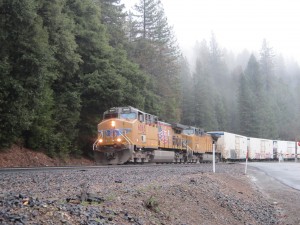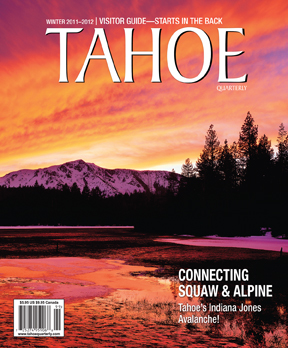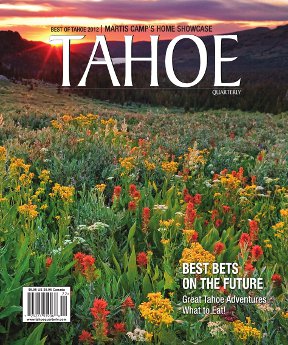From Dutch Flat to Bali

A Union Pacific train rumbles across the road leading to Dutch Flat, Calif. The track is part of the Transcontinental Railroad, and a Dutch Flat pharmacist helped make the railway a reality. Photo by Trina Kleist.
Written by Trina Kleist
DUTCH FLAT, Calif. – The connection between Dutch Flat and the Berkeley-Oakland area reaches to the 1880s and wraps the story of fiber artist Judith Scott to the Lake Tahoe region.
Between the childhood separation of the fraternal twins and their reunion 36 years later, Judith’s sister Joyce Scott studied psychology and child development, moved from Ohio to Berkeley, became a registered nurse and formed a bond with University of California professor Dr. Edward Cassady and his wife, Gen. “They were my ‘California parents,’” Joyce Scott writes.
The couple had a weekend house in Dutch Flat they had purchased in the 1920s – something that happened a lot then, says Douglas Ferrier, president of the town’s Golden Drift Historical Society and himself a Berkeley native.
After 1884, when a federal judge restricted hydraulic mining in parts of California and the nearby diggins shut down, many Dutch Flat residents moved to Berkeley and Oakland. “But they remained fiercely loyal to the town,” says Ferrier, who runs the town’s museum on Main Street. “They formed the Dutch Flat Reunion Club, and about 100 people would show up” every August in Oakland’s Mosswood Park; the gathering ceased about 1940. Part of a prominent Dutch Flat banking family also lived in Berkeley. And, one native son became a law professor at Berkeley’s Boalt Hall around 1900.
Probably following those connections, a handful of other Berkeley professors started buying homes and land here, Ferrier adds.
In 1990, Joyce Scott and husband John Cooke bought acreage on Little Bear River out of town and built a cottage in 2004.
“Judy absolutely loved Dutch Flat,” Joyce Scott recalls. “She would clap wildly when she would see we were headed that way… She liked to point things out, like the moon.”
At the cottage, the twins enjoyed cooking and spending time on the deck outside, Joyce Scott recalls.
“She liked to wash dishes and tidy up,” Joyce Scott recalls of her sister. “She liked to sit in her big recliner while looking at her magazines and keeping an eye on everyone. She especially loved playing with the very young grandchildren, loved playing cards with all of us (something we did several times a day) and loved her bath at night.”
Like many people with Down syndrome, Judith Scott had a congenital heart defect. In 2005, she died at the cottage while sleeping in Joyce’s arms.
Joyce Scott continues to work at providing opportunities for others to discover their unique gifts. Two decades ago, she and Cooke founded the Bali Children’s Project, after visiting the South Pacific island and encountering its poverty. With the help of volunteers, they provide children in mountain villages with school materials, tuition and art classes. The couple lives part-time in the Bedugul region of the central highlands.
“Our dream has been to start an arts and disabilities program in Judith’s name, and we are in the process of doing that!” Joyce Scott writes. She estimates the project could open next year, modeled after the program at Creative Growth Arts Center in Oakland, Calif., where Judith produced more than 200 extraordinary objects that have garnered international acclaim.
Category: Arts & Culture, Personalities






